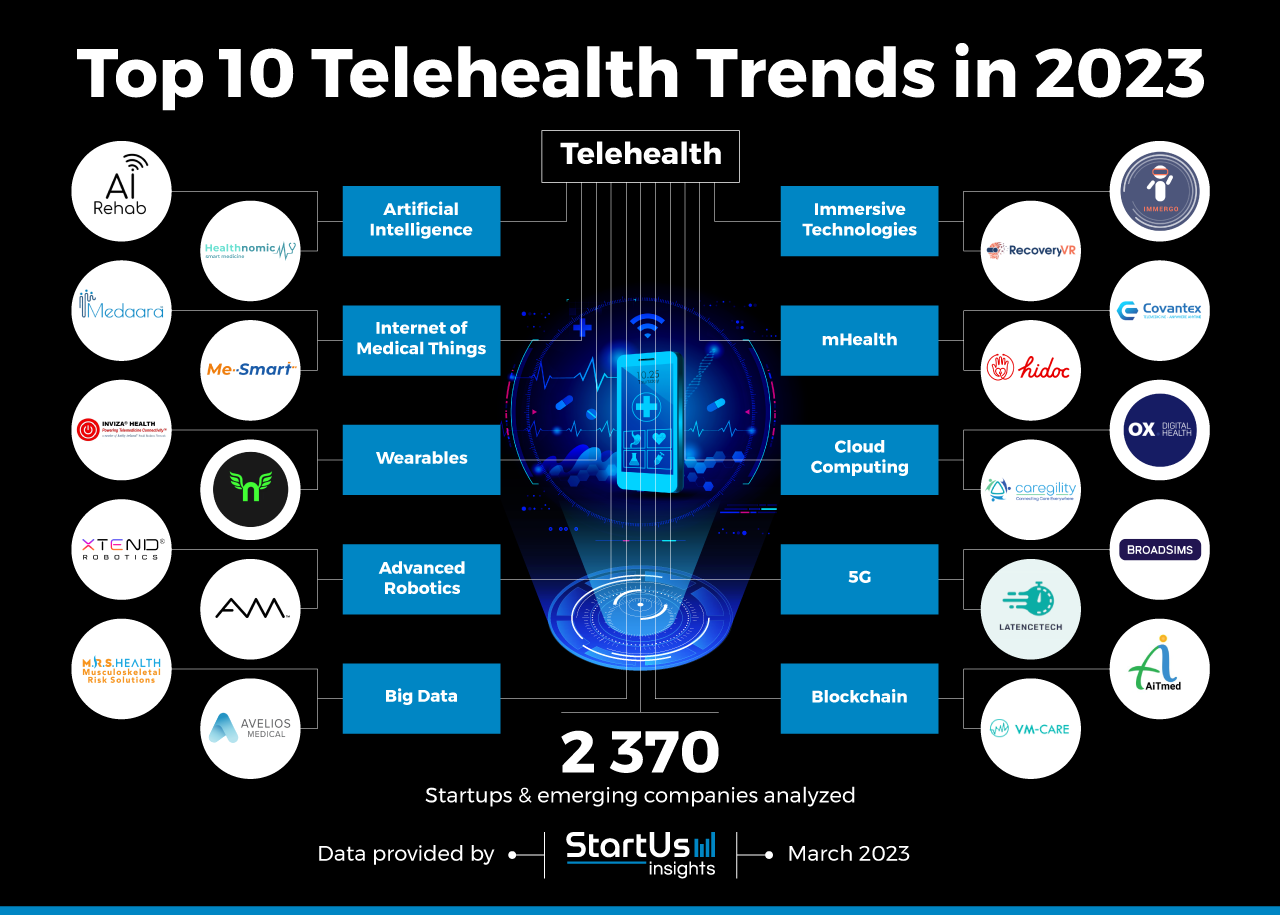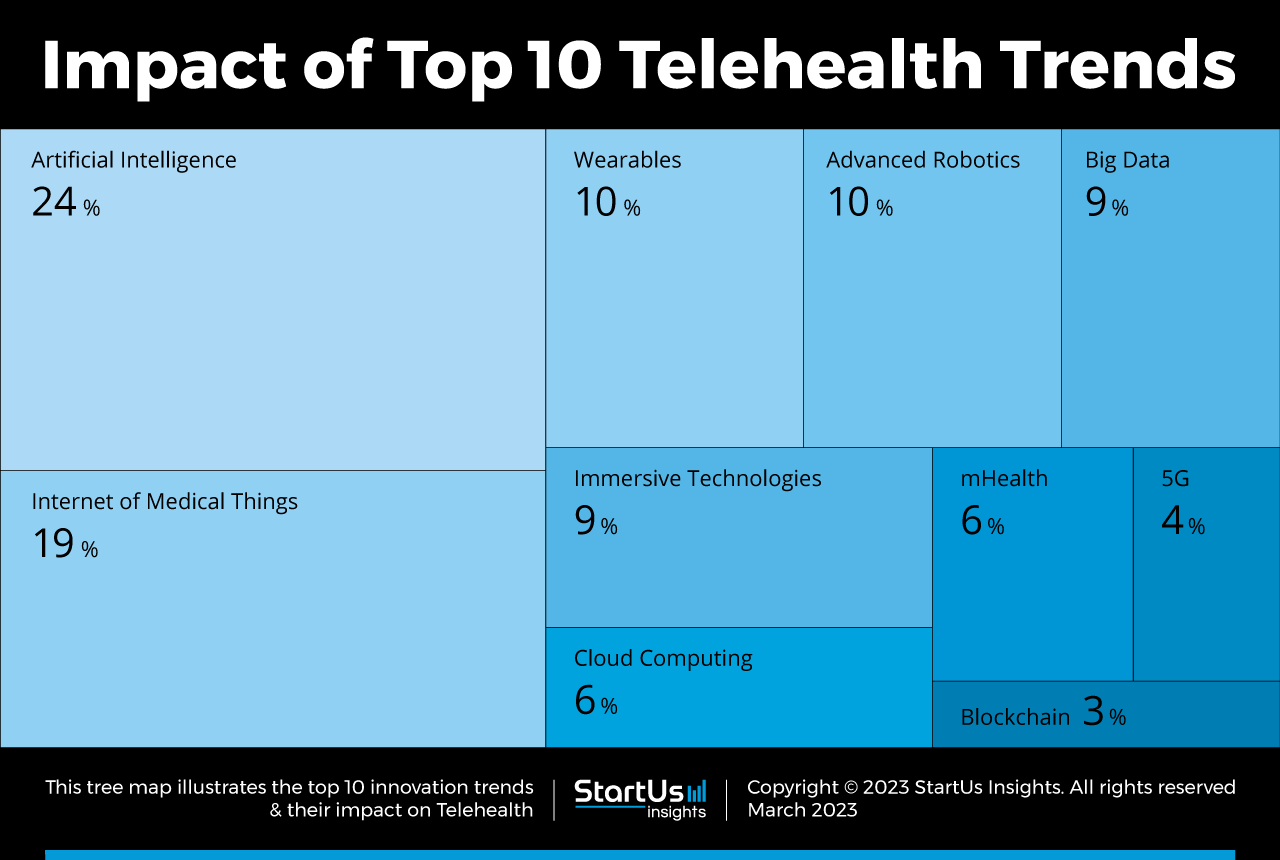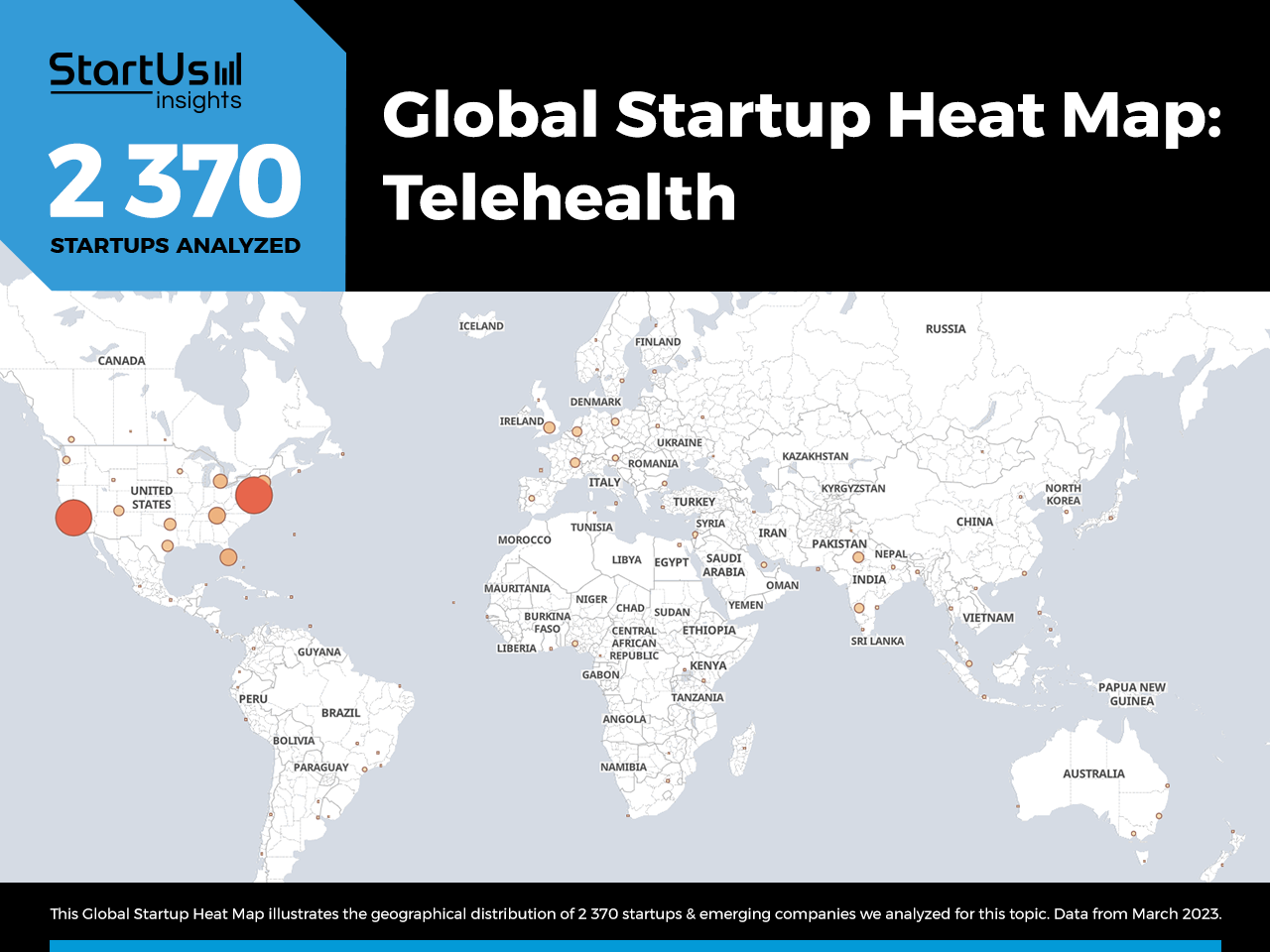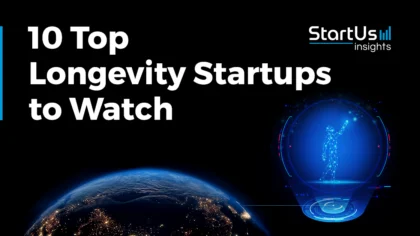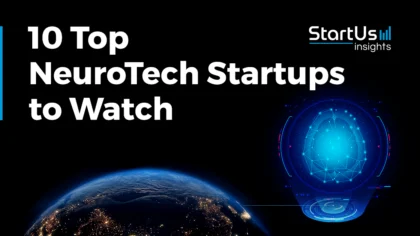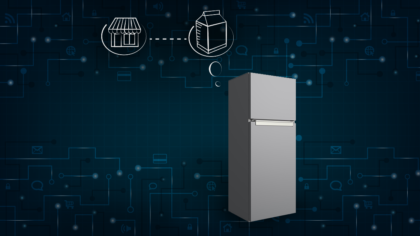Accelerate Productivity in 2025
Reignite Growth Despite the Global Slowdown
The COVID-19 pandemic has caused a significant increase in the adoption of telehealth, resulting in a higher demand for remote healthcare services. To meet this demand and improve the effectiveness of telehealth, healthcare providers utilize advanced technologies such as artificial intelligence (AI), robotics, and the internet of things (IoT) to automate tasks and provide more personal and efficient care. These technologies also enable virtual healthcare assistants, remote monitoring, and real-time data analysis, which facilitate communication and coordination between healthcare providers and patients. Further, immersive technology and mHealth are enhancing the overall patient experience and making it easier for patients to access healthcare services. In this report, you get to explore the top 10 telehealth trends and 20 innovative startups in the field.
Innovation Map outlines the Top 10 Telehealth Trends & 20 Promising Startups
For this in-depth research on the Top 10 Telehealth Trends & Startups, we analyzed a sample of 2370 global startups & scaleups. This data-driven research provides innovation intelligence that helps you improve strategic decision-making by giving you an overview of emerging technologies in the health tech industry. In the Telehealth Innovation Map below, you get a comprehensive overview of the innovation trends & startups that impact your company.
These insights are derived by working with our Big Data & Artificial Intelligence-powered StartUs Insights Discovery Platform, covering 3 790 000+ startups & scaleups globally. As the world’s largest resource for data on emerging companies, the SaaS platform enables you to identify relevant technologies and industry trends quickly & exhaustively.
Tree Map reveals the Impact of the Top 10 Telehealth Trends
Based on the Telehealth Innovation Map, the tree map below illustrates the impact of the Top 10 Telehealth Trends in 2023. Advanced technologies such as AI, robotics, and IoT are enhancing and improving remote healthcare services. These technologies automate tasks, provide personalized care, and improve communication between healthcare providers and patients. Further, virtual assistants, remote monitoring, and real-time data analysis are other technological innovations that revolutionize telehealth. Immersive technology, wearables, and mobile health apps also transform patient experiences and enable convenient access to healthcare services. Overall, these telehealth trends will continue to shape the future of healthcare, bringing positive changes for all stakeholders.
Top 10 Telehealth Trends in 2023
- Artificial Intelligence
- Internet of Medical Things (IoMT)
- Wearables
- Advanced Robotics
- Big Data
- Immersive Technologies
- mHealth
- Cloud Computing
- 5G
- Blockchain
Global Startup Heat Map covers 2370 Telehealth Startups & Scaleups
The Global Startup Heat Map below highlights the global distribution of the 2370 exemplary startups & scaleups that we analyzed for this research. Created through the StartUs Insights Discovery Platform, the Heat Map reveals extremely high startup activity in the US, followed by moderate activity in Europe and the Asia-Pacific. Below, you get to meet 20 out of these 2370 promising startups & scaleups as well as the solutions they develop. These telehealth startups are hand-picked based on criteria such as founding year, location, funding raised, & more. Depending on your specific needs, your top picks might look entirely different.
Top 10 Telehealth Trends in 2023
1. Artificial Intelligence
One of the major challenges in telehealth is the lack of face-to-face interaction between healthcare providers and patients. AI bridges this gap by offering chatbots or virtual assistants that handle simple tasks, such as scheduling appointments and answering basic questions. AI also facilitates communication between healthcare providers and patients through real-time alerts and information sharing. Another challenge in telehealth is the need to quickly and accurately analyze large amounts of data, such as patient records and test results. AI streamlines this process and identifies potential health risks to suggest appropriate treatment options. To aid this, telehealth startups build predictive analytics and machine learning algorithms that detect patterns in data and provide useful insights.
AI Rehab offers Remote Physiotherapy
AI Rehab is a UK-based startup that designs telehealth solutions for patients recovering from hip and knee surgeries. The startup’s products combine augmented reality (AR) and wearable remote sensors to make it easier for patients to perform pre and postoperative exercises. They also feature built-in alerts for remote notification in case a patient’s progress deviates from the expected pathway, ensuring timely intervention and therapy adherence. Additionally, the use of patient-reported outcome measures (PROMS) standardizes the measurement of results and provides tangible, measurable data for physiotherapy. With AI Rehab, patients receive care and support as they work towards a full recovery.
Healthnomic facilitates Obstructive Sleep Apnea Diagnosis
Healthnomic is a Polish startup that specializes in telemedicine using deep learning and AI. The startup develops comprehensive algorithms and systems that address modern healthcare challenges. It offers home-based polygraphic examinations as an alternative to hospital polysomnography. This allows patients to remotely diagnose and treat obstructive sleep apnea, a serious and chronic disease that is a source of many civilization disorders.
2. Internet of Medical Things
The adoption of telehealth gives rise to the need for constant monitoring and tracking of patient health data, such as vital signs and medication adherence. To remotely monitor and manage the health of patients with chronic conditions, such as diabetes or hypertension, healthcare facilities leverage IoT. IoMT-enabled smart devices and remote monitoring systems provide real-time data and alerts to healthcare providers. This allows them to make more informed decisions on patient treatment and management. One key application of IoMT is devices such as fitness trackers and smartwatches used to monitor a person’s activity levels, heart rate, and sleep patterns.
Medaara builds a 3D Healthcare System
Medaara is an Indian startup that builds 3D remote interaction machines (HCRIM) for remote patient consultation. The virtual machine is powered by 5G and satellite for connectivity as well as features an oximeter, auscultation, BMI measure, and thermal check for examining patient vitals. Additionally, the mini-clinic uses AI-based 3D anatomical structures to assess symptom identification. The IoMT kiosk connects doctors remotely with patients and enables automatic basic medical examination. Medaara improves telehealth in smart cities as well as remote areas.
Me-Smart develops a Telehealth Platform
Me-Smart is a Slovakian startup that offers solutions in the field of digitization in healthcare. The startup develops digital telemedicine tools that improve the quality of medical services, particularly in the era of COVID-19. It offers a wide range of solutions, including telemedicine software, medical information systems, and electronic medical records (EMR) software. In addition, the startup has mHealth, remote monitoring apps, IoMT solutions, and patient portals and applications. It offers IDIS2GO, a telehealth medical diagnostic system to collect the patient diagnostic data automatically, and transmits it to the doctor via the cloud with a unique examination number. The software also improves medical workflows, enhances treatment and diagnostics, and ensures secure data transfer between healthcare departments. With Me-Smart’s products, patients take control of their health and receive home-based medical care.
3. Wearables
Medical wearable devices have the potential to significantly advance telehealth by solving several challenges. They continuously collect and transmit data to healthcare providers, enabling more timely and accurate patient health assessments and early disease detection. Wearable devices further improve the efficiency and effectiveness of telehealth by enabling the continuous collection and analysis of health data. Startups develop devices, like patches, bands, and more, for continuous glucose monitoring (CGM) to track patient glucose levels. Also, smart inhalers are used for asthma and chronic obstructive pulmonary disease (COPD) monitoring.
Inviza Health provides Insole-based Vitals Monitoring
Inviza Health is a US-based wearable and digital therapeutics (DTx) startup that offers a range of products to improve health and safety monitoring. Its product line includes self-charging wearables, such as the InvizaSole 1.0 which serves as a remote patient monitoring (RPM), remote therapeutic monitoring (RTM), and personal emergency response system (PERS) shoe-insole. The company also offers a digital health mobile app, InvizaLife 1.0, and a telehealth web portal and dashboard, InvizaCare 1.0. These products work together to provide a complete end-to-end solution for continuous health and safety monitoring, making it easier for patients to receive care.
Notus Labs develops Wristbands for Clinical Insights
Notus Labs is a US-based startup that is developing Notus One, a wearable for athletic performance optimization. It provides the tools and information required to improve athletes’ performance with the help of wearable data. The wearable continuously monitors heart rate and delivers ECG data. The wearable, powered by machine learning algorithms, performs more than 1500 measurements per second. With its advanced features, the Notus One helps athletes achieve their goals and reach higher targets in athletic performance.
4. Advanced Robotics
The need for remote examination and diagnosis of patients is increasing, particularly in rural or underserved areas. Advanced robotics solves this challenge by enabling the use of telepresence robots that remotely connect healthcare providers with patients, allowing for real-time examination and intervention. This reduces the need for in-person visits and improves access to healthcare for patients in remote or underserved areas. Additionally, the use of telerobots in surgeries is successful. The use of robots for telehealth improves the accuracy of the tasks as well as is safer in terms of hygiene.
XTend Robotics builds In-home Monitoring Robots
XTend Robotics is an Israeli startup that develops telepresence robots for healthcare. The startup offers an architecture that enables users to develop service robots that are customizable to industry requirements. The healthcare robots are well-suited for nursing homes, elderly care centers, medical facilities, and in-home deployments. These telepresence robots simplify patient care by offering a 24-hour services.
AvatarMEDIC makes Telepresence Robots
AvatarMEDIC is a US-based startup in the field of telemedicine and robotics. The startup specializes in integrating and implementing caregiving collaborative telepresence robots in long-term care facilities. With the use of advanced robots, AvatarMEDIC allows remote healthcare professionals to interact with patients and provide care from a distance. By utilizing telepresence, the startup also bridges the gap between patients and healthcare providers to improve the quality of care.
5. Big Data
Big data and analytics significantly improve telehealth by providing healthcare facilities with more comprehensive and accurate information about patient health. It enables personalized treatment recommendations, delivers real-time clinical decision support, and improves population health management strategies. The use of big data also improves patient outcomes by enabling more personalized and effective treatments. Big data analytics allows early detection of diabetes and cardiovascular diseases as well.
M.R.S Health delivers Health Data Analytics
M.R.S. Health is a US-based startup that provides comprehensive musculoskeletal risk solutions for corporations. The startup’s EVE platform utilizes data analytics, functional restoration, and telehealth. It offers a turnkey program for the prevention of musculoskeletal disorders and manages the whole treatment process. Further, the platform first analyzes claims data to present a customized solution for the overall population and at-risk patients. EVE provides ongoing surveillance with monthly monitoring of medical and pharmacy data as well as selects high-risk patients for telehealth-based functional restoration programs.
Avelios Medical enables Data-driven Patient Care
Avelios Medical is a German startup that develops a comprehensive digital platform for hospitals. It digitizes hospital workflows and documentation and automates the generation of structured treatment data. As a result, the platform enables data-driven research, business intelligence, workflow automation, and the creation and incorporation of AI algorithms. The platform, in turn, supports doctors and staff in their daily tasks and provides data-driven patient care.

6. Immersive Technologies
Immersive technologies, such as virtual reality (VR) and AR, compensate for the physical presence by providing virtual environments. They enable interactive, remote, real-time consultation and examination. Additionally, healthcare professionals leverage extended reality (XR) solutions to offer interactive and engaging learning experiences remotely and improve healthcare provider and patient education and training. These technologies simplify surgery planning and training to a great extent. The AR glasses and displays enable doctors to perform challenging surgeries as well as aid patients in physical therapies from the comfort of their homes.
Immergo Labs facilitates 3D Virtual Clinics
Immergo Labs is a US-based healthtech startup that supports physical therapists by providing technology solutions. They improve the telehealth model for providing care and enhance the human connection critical to the industry. Immergo Labs conducts research, surveys, and interviews with practitioners to understand their challenges and develop novel metaverse technologies that help therapists provide care to their patients from anywhere and at any time.
RecoveryVR increases Patient Engagement in Therapies
RecoveryVR is an Australian startup that creates virtual reality technology for neuro-rehabilitation. Its solution utilizes VR to provide engaging and effective therapy to patients, reducing wait times and making professional therapy more accessible. The solution delivers one-on-one therapy videos, outdoor exercises, mini-games, and imagery for those with limited mobility. Consequently, the startup helps patients perform meaningful and evidence-based clinical practice in the hospital or from the comfort of their own homes.
7. mHealth
In the era where almost every possible service is available through a smartphone, healthcare is no different. Startups and scaleups build applications that allow patients to choose doctors as per their preferences and availability. Mobile health solutions digitalize and democratize healthcare while ensuring quality patient care. Such applications allow doctors to easily keep track of their appointments. mHealth also allows healthcare providers to remotely monitor patients’ health conditions, such as blood pressure, glucose levels, and heart rate, and receive real-time updates on changes in patient health status.
Covantex develops a Mobile Health Platform
Covantex is a Polish healthcare technology startup that provides digital solutions for the management of clinical trials. The startup’s platform-as-a-service (PaaS) solution streamlines clinical trials by bringing together all stakeholders, including sponsors, contract research organizations (CROs), and sites. It improves the efficiency, accuracy, and speed of clinical trials, leading to faster drug development and better patient outcomes.
Hidoc builds a Telehealth Application
Hidoc is a Singaporean startup that develops a comprehensive telehealth platform offering virtual and in-clinic consultations with over 100 healthcare specialists across 25 medical fields. The platform covers a wide range of medical needs, from minor symptoms to complex cases, and provides follow-up care with registered nurses. Hidoc also allows users to manage medical appointments, access medical records, and read educational content all through a single app.
8. Cloud Computing
With the rising concerns around data security and compliance, securely storing and accessing large amounts of data, such as patient records and medical images, is a big priority for healthcare businesses. Cloud computing provides secure and scalable infrastructure for storing and accessing data. This allows healthcare providers to access data from any location and from any device, improving the efficiency and effectiveness of telehealth. Apart from data storage and data accessibility, cloud computing also simplifies virtual consultations and remote monitoring. Finally, cloud computing provides a secure and centralized platform for storing electronic health records (EHRs).
Ox Digital Health (OxDH) simplifies Healthcare Data Storage
OxDH is a UK-based digital health startup that provides a platform to connect patients with experienced medical professionals through its secure and user-friendly telehealth app. With a focus on delivering healthcare services, OxDH improves the patient experience, reducing wait times while ensuring fast and convenient access to medical consultations. The startup’s platform provides a comprehensive range of services, including video consultations, medical appointments, access to medical records, and educational content. They empower patients to take control of their health and wellness.
Caregility builds a Cloud-based Virtual Care Platform
Caregility is a US-based startup that builds Caregility Cloud, a HIPAA-compliant, virtual care platform that connects patients and clinicians globally. It provides secure and reliable audio and video communication. The startup also offers iObserver for continuous observation of at-risk patients and iConsult for faster and more secure virtual appointments. These platforms are accessible through any device and support various clinical workflows in acute and ambulatory settings. Caregility thus offers solutions across the care continuum, from critical and acute to post-acute and ambulatory, connecting care for anyone, anywhere.
9. 5G
5G transforms the delivery and experience of telehealth. With its high-speed and low latency, 5G enables telehealth solutions to provide real-time audio and video communication, allowing virtual consultations that are as close to in-person consultations as possible. Additionally, 5G supports more devices and users at once, allowing healthcare providers to mitigate network congestion and ensure patient access to care. 5G also enables near real-time remote patient monitoring that allows healthcare providers to keep track of patients’ vital signs and symptoms even when they are away from the hospital or clinic. This improves the quality of care and also reduces the number of trips patients have to make to healthcare facilities.
Broadsim enables 5G-based Remote Patient Monitoring
Broadsims is a Taiwan-based startup that makes simulation technology to provide interactive medical simulation training. The startup’s 5G platform enables and offers a wide range of virtual simulations for medical professionals and students to improve their skills and knowledge in various medical procedures. It includes simulations for surgical procedures, emergency response scenarios, and patient care and management. With the help of their user-friendly interface, Broadsims provides a realistic and immersive learning experience to enhance the knowledge of healthcare professionals.
LatenceTech advances Real-Time 5G Network Monitoring
Canadian startup LatenceTech provides a cloud and AI-based monitoring and analytics solution for low latency connectivity networks such as private 5G. It offers real-time measurement and advanced analytics to network detect anomalies, predict future events and perform root cause analysis with a focus on latency. The startup also offers a mobile app that allows users to perform spot latency checks. LanceTech’s solutions facilitate better connectivity for telehealth applications.
10. Blockchain
Blockchain increases data security, reduces costs, and improves access to telehealth services. Its decentralized and secure nature ensures that sensitive medical data is protected and accessible only to authorized parties. With the use of smart contracts, blockchain streamlines administrative processes and reduces costs by eliminating intermediaries and reducing the need for manual verification of medical records. Additionally, blockchain makes telehealth services more accessible, especially in rural areas, by allowing for secure remote communication between patients and healthcare providers. This reduces the need for travel and improves access to care.
AiTmed offers a Blockchain-based Telemedicine Platform
US-based startup AiTmed offers a blockchain-based telemedicine platform to provide analysis of individual health trends and conditions. For healthcare providers, the startup’s AI-assisted documentation and streamlined e-referral system enable seamless communication with patients and facilitate the delivery of optimal care. Additionally, healthcare administrators enhance their management system with the AiTmed Admin. The user-friendly schedule manager, patient management system, and EHR, along with the convenience of a one-click e-referral, help to establish a smooth workflow for the healthcare industry. AiTmed’s telehealth portal thus provides a low-cost service for both patients and enterprise customers through its mobile and web applications.
VM-Care enables Blockchain-based Preventive Healthcare
VM-Care is a Finish telehealth startup that offers a cloud-based virtual care platform for patients and healthcare providers. It provides secure and convenient access to remote healthcare services through blockchain. The PHR D-App is the startup’s IoT-enabled solution that supports virtual consultations, appointment scheduling, and remote patient monitoring. VM-Care improves access to quality healthcare for patients in remote or underserved areas through its solution.
Discover all Telehealth Trends, Technologies & Startups
Telehealth technologies have the potential to improve the efficiency and effectiveness of healthcare delivery, real-time consultation, and examination. Further, the technologies help with the continuous collection and analysis of patient data, remote monitoring, and management of chronic conditions. Such solutions also improve access to health information and educational materials. Other exciting technologies in telehealth include nanotechnology, 3D printing, and cognitive automation. The telehealth trends & startups outlined in this report only scratch the surface of trends we identified during our data-driven innovation & startup scouting process. Identifying new opportunities & emerging technologies to implement into your business goes a long way in gaining a competitive advantage.

